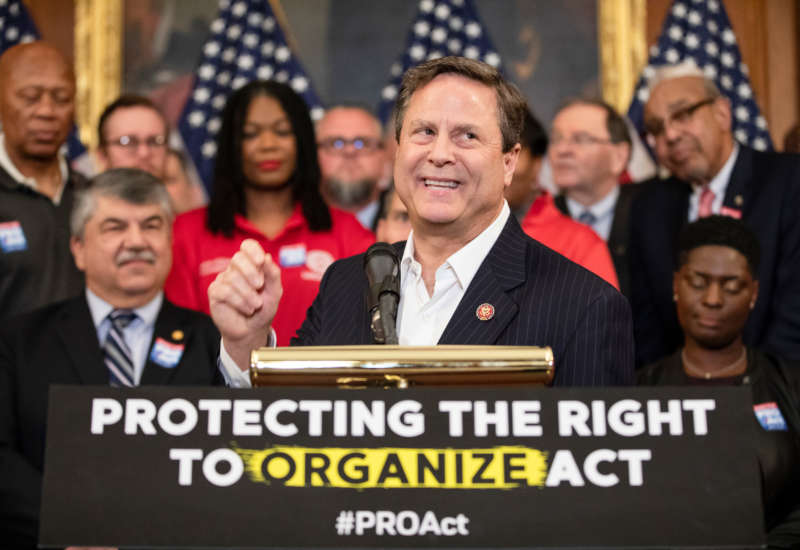The Congressional Labor Caucus has called on the Senate to pass a sweeping bill that would strengthen U.S. labor laws in response to Starbucks’s increasingly brazen union-busting tactics over the past weeks.
The House representatives are demanding the passage of the Protecting the Right to Organize (PRO) Act, a bill championed by the labor movement that would make it easier for workers to organize and form unions.
“We have had it with corporate spokespeople and lobbyists saying they’re pro-worker when asking for meetings on Capitol Hill, while at the same time using every trick in the book to stop unionizing efforts cold in their tracks,” the caucus said in a statement. “Workers have the right to organize – it’s time they had a level playing field to do so.”
The House passed the legislation last March, but due to uniform opposition from the GOP and several Democratic holdouts in the Senate, including Sen. Kyrsten Sinema (D-Arizona), it currently stands little chance of passing into law.
Lawmakers in favor of the PRO Act have lamented the weak state of the country’s labor laws.
“There hasn’t been any real meaningful change in labor law in over half a century,” Labor Caucus Co-Chair Rep. Donald Norcross (D-New Jersey) told Truthout. When it comes to union-busting moves like Starbucks’s mass firing of what the union says was the entire organizing team at a Memphis store, “there is no real recourse in terms of punitive damages,” he went on.
Starbucks Workers United has filed a complaint with the National Labor Relations Board (NLRB) over the terminations, calling the firings the company’s “most blatant act of union-busting yet.” Norcross called the company’s move an “amateur error,” especially considering that the company has been working with at least 30 lawyers from one of the country’s most notorious union-busting law firms.
“It’s ridiculous. You know, you’re paying eight bucks for a cup of coffee. The CEO made $20 million last year and [the company] won’t even talk to them about organizing to give their employees a voice,” Norcross said. “Stupid is probably the nicest thing I can say about Starbucks right now.”
But even if the NLRB finds that Starbucks violated federal labor laws mandating that companies can’t retaliate against workers for organizing, the punishment for the $100 billion company would be little more than a slap on the wrist. The only liability for Starbucks would be that they would have to give the fired workers back pay, which is no more than the usual cost of operations.
The PRO Act would implement harsher penalties for companies that violate labor laws and would place further restrictions on the actions that companies can take to union bust. Many of its provisions would directly make Starbucks workers’ union campaign easier – among other things, the bill would outlaw captive anti-union meetings, which Starbucks has been conducting in stores across the country.
Despite the current state of labor laws, however, the company’s attempts to break up organizing efforts may still backfire. The firing is “more empowering than anything for those workers,” Norcross said.
Indeed, the day after the terminations, workers in Oklahoma City said in their union campaign announcement letter to CEO Kevin Johnson that the firings only added fuel to the fire of their movement.
“This termination was blatant retaliation, and while it was meant to discourage the formation of the committee we are announcing today, it has only emboldened us and highlighted the need for this union even more,” the workers wrote. Several stores have filed to unionize since the termination, bringing the current total to about 80 locations.
The more attention the union campaign gets, the more support it seems to pick up. On Thursday, four New York City area stores filed to unionize – and with their campaign announcements, 76 New York lawmakers, including members of Congress like Senate Majority Leader Chuck Schumer (D) and Rep. Alexandria Ocasio-Cortez (D), signed a letter to Johnson asking the company to adhere to non-interference principles laid out by the union.


